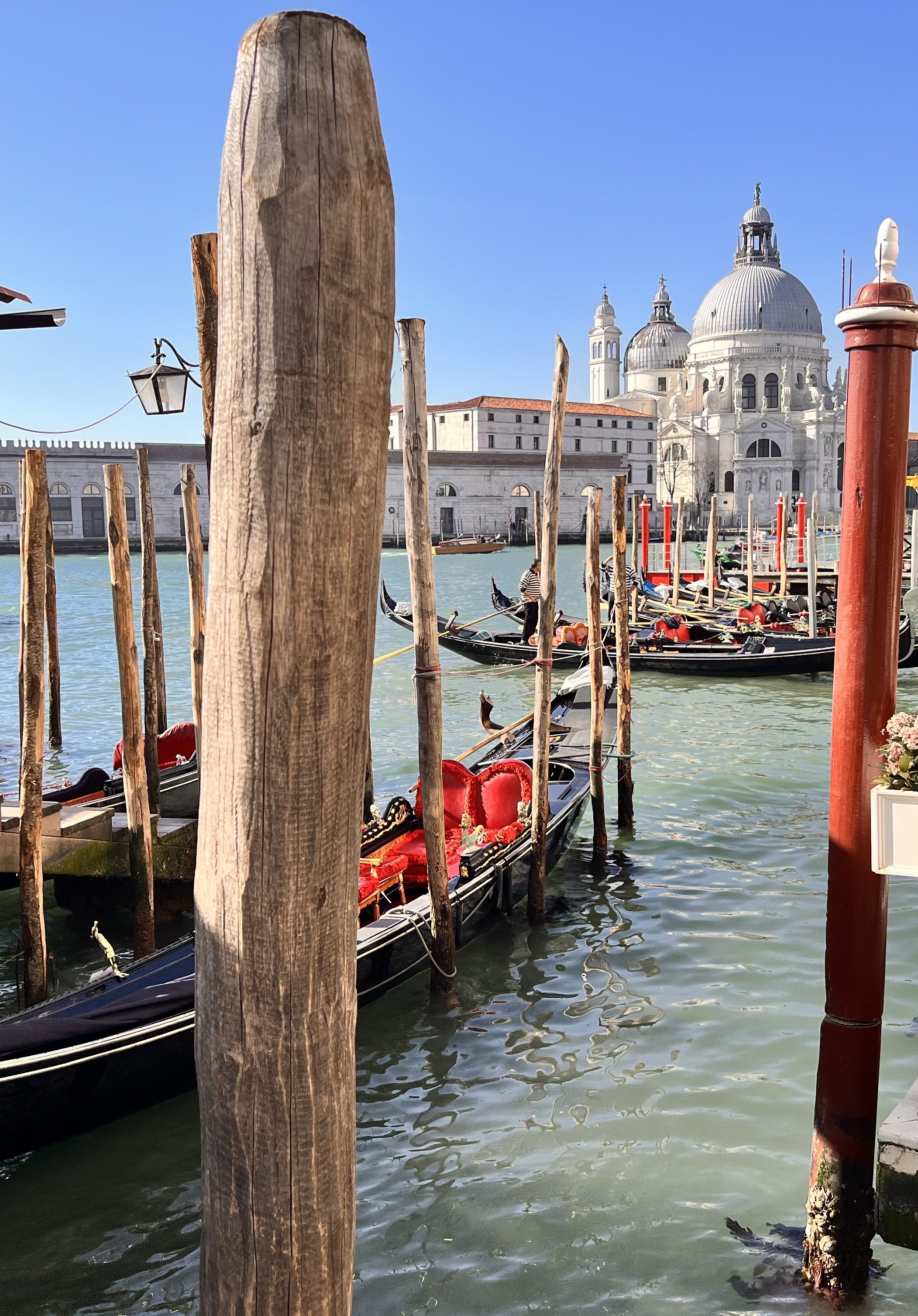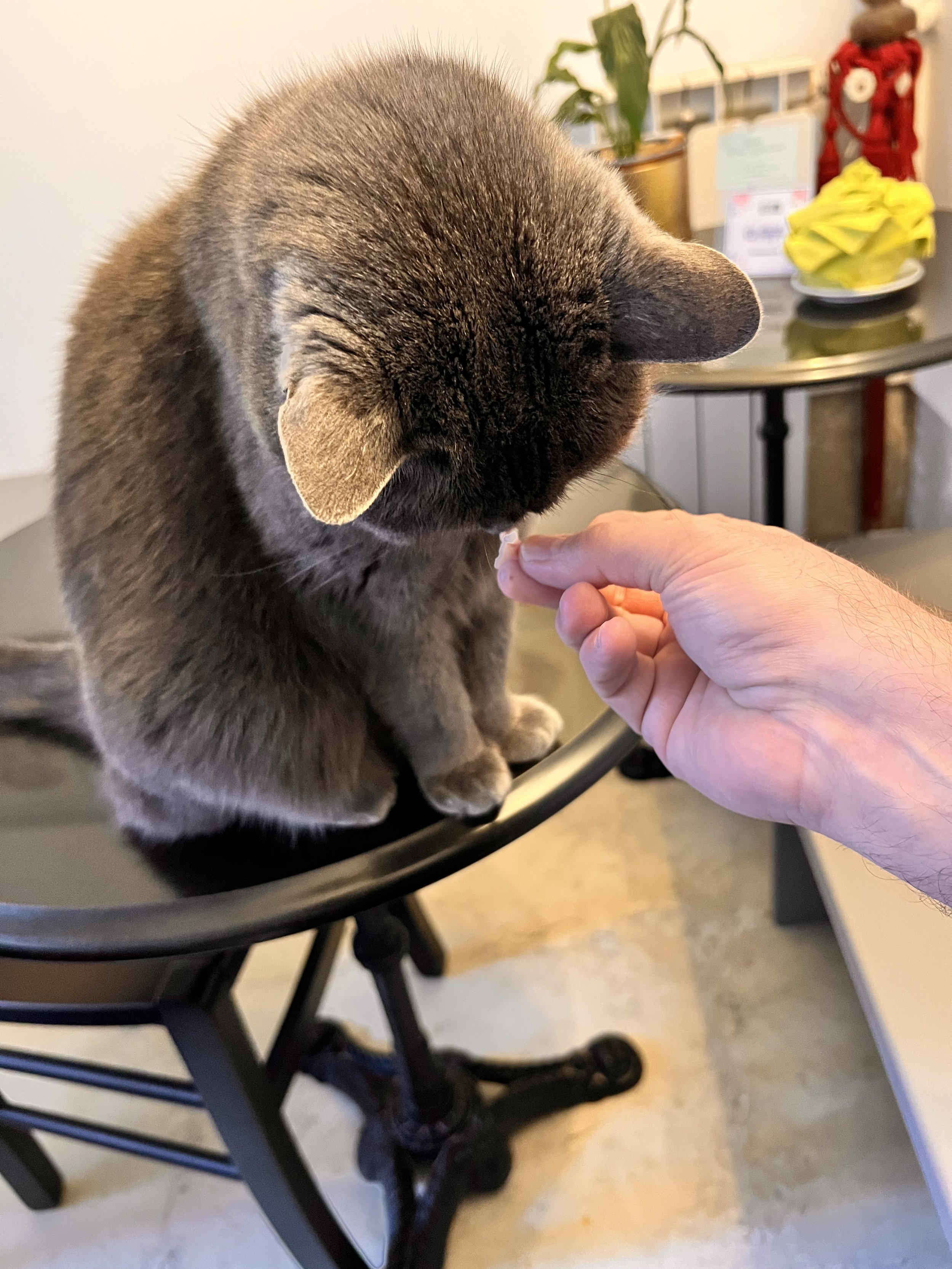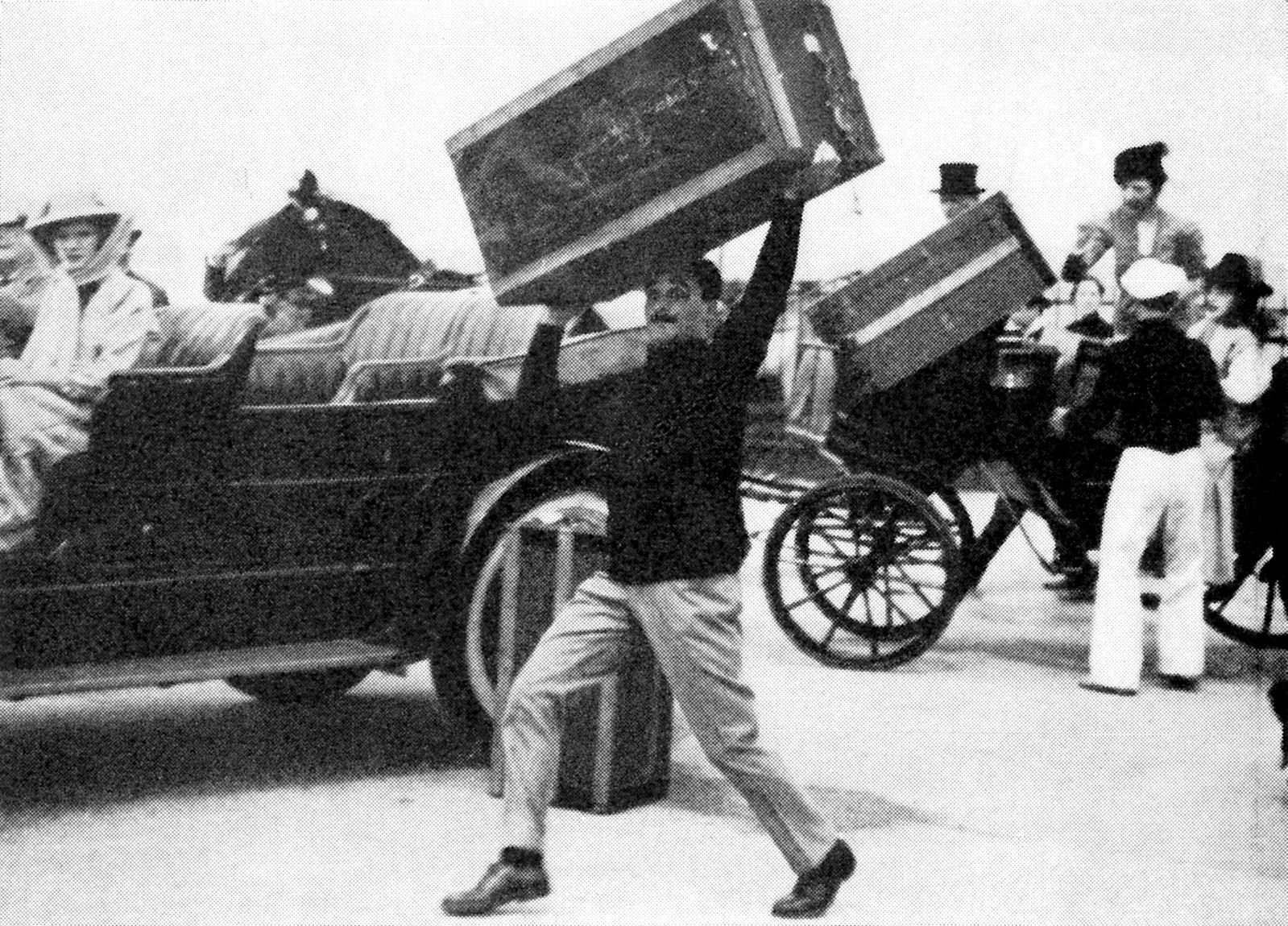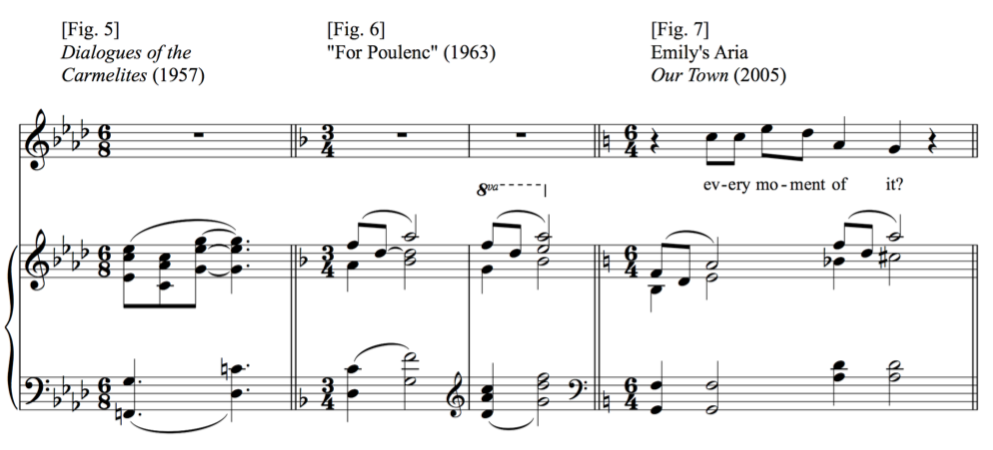First, the familiar ritual of crossing from the real world via the Ponte della Libertà to the Floating World; next, disembarking at Santa Lucia Station, thinking of the old violin professor’s farewell; finally, the people streaming down the graceful marble steps to the canal like water gushing in slow motion from a sluice. Limbo. At this point, stepping into any vaporetto, any ferryboat, will do: spoken Italian, German, Russian, very little English, the powerful, brutish diesel engine’s snarling as it is thrown into reverse, laughter trampolining off the water. I look up. Across the canal I see not a woman in a blue pea coat but a young girl in a white dress with a red ribbon holding an old man’s hand, her other hand shielding her eyes from the midday sun. Will I get off in Murano and visit the graves of Stravinsky, Nono, and Diaghilev at San Michele? Not this time; this time, only life in Venice. If a montage beat is notated in a screenplay with ellipses, then what is the musical equivalent?
The picture you always see on tourist websites: the Basilica della Salute. (p/c: Daron Hagen)
Welcome back then, to the transience of Venice; ave to its addiction to suggestibility; a nod to our old acquaintances misattribution, and the persistence of forgetting. A toast to memories receding and growing more untrustworthy — particularly here, where the sweat that pools at the base of your spine when you’re late, rushing, and lost feels like sickness, the hand pressing on your chest is not hot, but cold, infinitely patient and macabre. “Is this how this story ends?” you ask yourself just at the moment you’ve become pre-syncopal and you’re about to accept that you’re trapped in an M.C. Escher engraving where the tops and bottoms of the stairways meet up, the last of a dozen sunless, serpentine calles suddenly opens up to the Canal Grande and the full force of the sun hits you and you stop dead, you lose your place, the narrative derails, you go up, you hear something for the first time in the orchestra that you shouldn’t have because you’re not playing your assigned part, your clammy shirt seizes up around you like a moist, limp handshake, and you suddenly understand, after all these years, what Dylan Thomas meant when he wrote that “old age should burn and rave at close of day.”
Fondamente Nove. Not the acqua alta in which I saw stars but the bright blue sky, dazzling sun scattering diamonds on the Adriatic wave tips. Not cheap rye from a silent Acheron-type bartender on a cold, windy, rainy night, but a cappuccino on the house from the waiter at the charming café that has replaced it. Pointing to my phone: “è morto,” I tell him, drawing my finger across my throat. Then, I didn’t have a phone number; this time the phone (and its GPS) died on the vaporetto from Santa Lucia, forcing me to be here. This spot. “Prego?” he asks. “No. Grazie.” Not lire, but euros on the table in front of me. I pull out my book. This I must remember on my own.
The very light pressure I use when sketching with my lucky mechanical pencil. Deep breath. Very long exhalation. Eyes closed. Focus pull. First the faint, straight tic tac toe of a map, then, opening my eyes, I attach the names I can remember: R to next street. R on Boteri. L on Cordoni. L on del Volta. R on 1st street (on R). Boca. Scanning the page, thinking, did I even know what a Rack Focus was back then? Yes, but I didn’t think that way then: it was all raw and wet and cold and febrile.
No laptop; just this book. Checking in to the Casa Boccassini, I hand over my passport. “I’m sorry – Scusi,” I say, without thinking. In English she replies, “you think you’re sorry, I’m Russian” and we leave it at that. A cat jumps on the counter in front of me, purring. Ariel, who has succeeded the polydactyl mouser Muse, who got out the front door one night never to return, and who I learn was in fact not blind, it was the dog who was blind, but I never knew him, so I had combined them in memory.
Ariel, Casa Boccassini’s house cat. (p/c: Daron Hagen)
In the absolute silence of 4 in the morning, awakened by the dings of my sons bidding me sweet dreams as they go to bed in New York six hours earlier, I think of Katherine Mansfield’s critique of Woolf’s Night and Day not reflecting the atomizing effect of the war. But now there is no night, no day, no Day for Night; the 24/7 news cycle and the Internet has ended all that. And here we are, now hurtling once again nella fauce del cane. I send them both heart emojis and mute the phone. But I’m up. The fear of forgetting. Scribbling, fast, in this book: working the whole thing out as a screenplay in my dreams. Closing the book, I try to get back to sleep, but remain hypnagogic.
Dings from the group chat of my colleagues at the Bogliasco Foundation, where I’m writing a book about making operafilms. They’re sharing pictures of the sunrise in Liguria. Now I am experiencing dormiveglia (the liminal zone of being half-asleep or semi-conscious). I can access my dream, which is as clear as a film: it is Carnevale and, earlier today, the angry vendor who hisses, “you wait for the priests to pass” as he holds the lapel of my leather jacket as I try to pass him; the real priests first, then the people beating taiko drums, then the celebrators dressed as celebrants, then the plague masks. “Now you go.” A slow walk to the Accademia to buy a book and pastries for the gang back in Liguria at Pasticceria Toletta, touching the trunks of the sycamores and noting the unchanging changing light, and then a fermata to light a candle at the Chiesa di San Moise for Bernie before walking to San Marco, stopping for dinner at Ristorante da Ivo, specials written by hand on the wall, everything unchanged, reading Bazin’s essays and arguing in the margins as I have since my teens, the long walk back by memory to the Cannaregio, stopping to watch people and to catch my breath and….
The Courtyard at Casa Boccassini (p/c: Daron Hagen)
The rosewater used to launder the sheets gives the room “the loved one” smell. I can no longer bear it. The sun has risen. I must get out. Like the old days, I’ve nothing to pack but my book bag, so I draw the sweaty sheets up on the bed, check for my passport, and pick up the key I’ve accepted for decades. I descend the steps to the garden and sit by the empty fountain to write about the female pilot throwing the lever earlier on the vaporetto: Charon, I think, which is pronounced Karen, I muse, asking her for her name, which is Serena. Had to be. “Serenissima,” I laugh, “were you born here?” “Of course,” she says. I raise my left hand to orans position and silently offer a greeting to the spirit of my old friend Frederick Hammond, who first introduced me to this hotel when we taught together at Bard College and, year after year, stayed here while working on his Frescobaldi treatise. It occurs to me that I was right when I wrote in my memoir, “Yes, this is how this story finally ends.” This gentle riff is enough. Not Muse, but Ariel, marks my legs and I reflexively reach down to scratch her neck, seeing that breakfast has been laid in the room just off the garden. All here is as it was and shall ever be, though the names and people will change.
Ariel means lion of God, I recall while standing in the Basilica di San Marco on my way back to Santa Lucia, about 24 hours after arriving. Soundtrack cue Monteverdi's Lasciatemi morire mixed with Welles V.O. “Maybe a man’s name…” from F for Fake under slow pan east-to-west looking straight up into the basilica’s cupola as I recall the conversation I had with Ford Lallerstedt in 1998 about the way that this specific physical space shaped Claudio Monteverdi’s counterpoint and how that effect might be reproduced visually. I take a picture with my resurrected phone of the sun shining through the stained-glass windows. Why try to put this moment behind bars? I think, erasing it. “You wait for the priests to pass,” he said. “All used up,” Dietrich said to Quinlin. “So, then, why not?” sigh the stones of Ruskin’s Venice, and I take another picture, one with which I will begin a new story, a new sequence of shots, a new tune whose cumulative effect will be … will be to be.




















